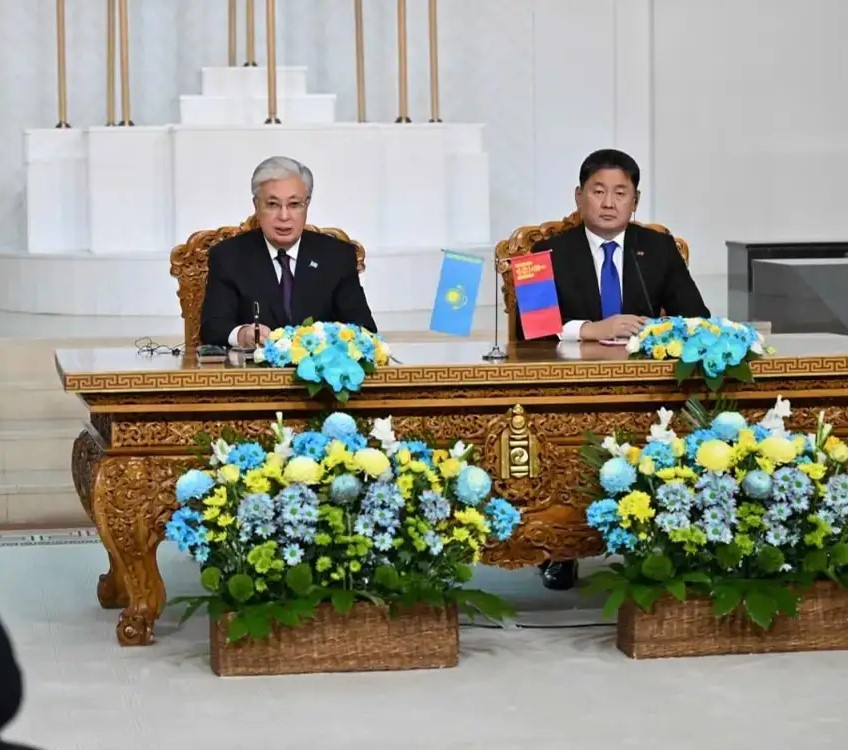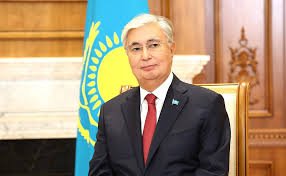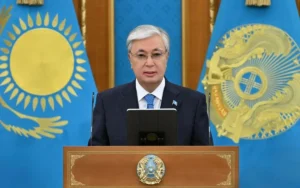Kazakhstan and Mongolia Elevate Ties to Strategic Partnership

Ulaanbaatar, The Gulf Observer: In a press conference following extensive bilateral talks, Presidents Kassym-Jomart Tokayev of Kazakhstan and Ukhnaagiin Khürelsükh of Mongolia announced a new era in Kazakh-Mongolian relations, with the signing of a joint Declaration on Strategic Partnership. The event, held in Ulaanbaatar, marked a milestone in diplomatic relations, coinciding with the 800th anniversary of the Ulus of Jochi, an occasion of symbolic importance for both nations.
President Tokayev expressed deep gratitude to President Khürelsükh for the invitation to Ulaanbaatar, emphasizing Mongolia’s role as a key neighbor and partner in the region. Tokayev highlighted the longstanding ties between Kazakhstan and Mongolia, rooted in shared history and cultural values, and noted the symbolic significance of the anniversary, underscoring a common heritage and aspirations for the future.
“Cooperation between Kazakhstan and Mongolia has advanced dynamically in recent years,” Tokayev stated. “Today, our relationship, built on enduring friendship, has been elevated to a strategic partnership. Our newly signed Declaration aims to strengthen this partnership and enhance collaboration across diverse sectors.”
The two leaders reviewed agreements to expand trade, economic cooperation, and cultural and humanitarian exchanges. Notably, they committed to increasing trade turnover, setting an ambitious target of $500 million from the current $150 million through an expanded range of goods and elimination of trade barriers. A comprehensive roadmap was signed to support these objectives.
Further discussions included joint initiatives in agriculture, manufacturing, transport, logistics, and energy. Kazakhstan pledged support in establishing a vaccine production facility in Mongolia to address livestock diseases. Additionally, the two countries examined opportunities in mining, technology, and investment, with Kazakh companies expressing interest in Mongolia’s mineral resources. Tokayev noted the importance of boosting transport and logistics to improve the competitiveness of international corridors, including the Trans-Caspian Route and North-South Corridor, to facilitate greater cargo flows.
The Kazakh-Mongolian Business Council recently held its inaugural meeting in Ulaanbaatar, yielding significant commercial agreements and documents. Tokayev encouraged the creation of favorable conditions for joint ventures and interregional ties, recognizing the role of the Kazakh diaspora in Mongolia as a “golden bridge” for friendship.
The discussions also touched on expanding cooperation in science, education, and culture. Kazakhstan invited Mongolian youth to study in Kazakh institutions and urged scholars and intellectuals from both countries to jointly explore their shared history. Tokayev emphasized that these steps would contribute to the prosperity of both nations.
On the international stage, Tokayev reaffirmed Kazakhstan’s commitment to collaborative efforts, highlighting the importance of supporting each other in regional and global forums. He expressed support for Mongolia’s pursuit of a free trade agreement with the Eurasian Economic Union, pledging Kazakhstan’s continued advocacy for strengthening multilateral ties.
In closing, both leaders emphasized the strategic nature of their partnership and the commitment to foster stability, prosperity, and shared growth in the region.


